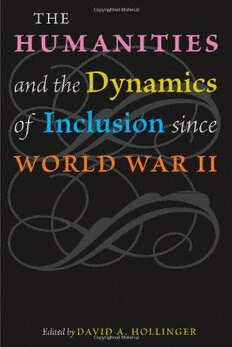
The Humanities and the Dynamics of Inclusion since World War II PDF
430 Pages·2006·3.208 MB·English
Most books are stored in the elastic cloud where traffic is expensive. For this reason, we have a limit on daily download.
Preview The Humanities and the Dynamics of Inclusion since World War II
Description:
The role played by the humanities in reconciling American diversity -- a diversity of both ideas and peoples -- is not always appreciated. This volume of essays, commissioned by the American Academy of Arts and Sciences, examines that role in the half century after World War II, when exceptional prosperity and population growth, coupled with America's expanded political interaction with the world abroad, presented American higher education with unprecedented challenges and opportunities. The humanities proved to be the site for important efforts to incorporate groups and doctrines that had once been excluded from the American cultural conversation.Edited and introduced by David Hollinger, this volume explores the interaction between the humanities and demographic changes in the university, including the link between external changes and the rise of new academic specializations in area and other interdisciplinary studies.This volume analyzes the evolution of humanities disciplines and institutions, examines the conditions and intellectual climate in which they operate, and assesses the role and value of the humanities in society.Contents:John Guillory, "Who's Afraid of Marcel Proust? The Failure of General Education in the American University" Roger L. Geiger, "Demography and Curriculum: The Humanities in American Higher Education from the 1950s through the 1980s" Joan Shelley Rubin, "The Scholar and the World: Academic Humanists and General Readers"Martin Jay, "The Ambivalent Virtues of Mendacity: How Europeans Taught (Some of Us) to Learn to Love the Lies of Politics"James T. Kloppenberg, "The Place of Value in a Culture of Facts: Truth and Historicism"Bruce Kuklick, "Philosophy and Inclusion in the United States, 1929--2001"John T. McGreevy, "Catholics, Catholicism, and the Humanities, 1945--1985"Jonathan Scott Holloway, "The Black Scholar, the Humanities, and the Politics of Racial Knowledge Since 1945"Rosalind Rosenberg, "Women in the Humanities: Taking Their Place"Leila Zenderland, "American Studies and the Expansion of the Humanities"David C. Engerman, "The Ironies of the Iron Curtain: The Cold War and the Rise of Russian Studies"Andrew E. Barshay, "What is Japan to Us"?Rolena Adorno, "Havana and Macondo: The Humanities Side of U.S. Latin American Studies, 1940--2000"
See more
The list of books you might like
Most books are stored in the elastic cloud where traffic is expensive. For this reason, we have a limit on daily download.
